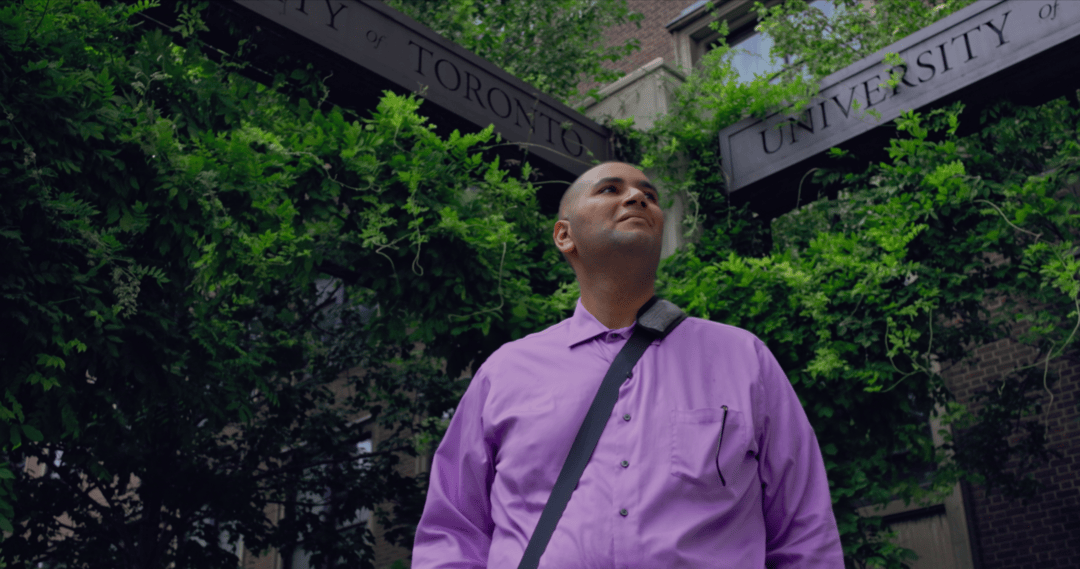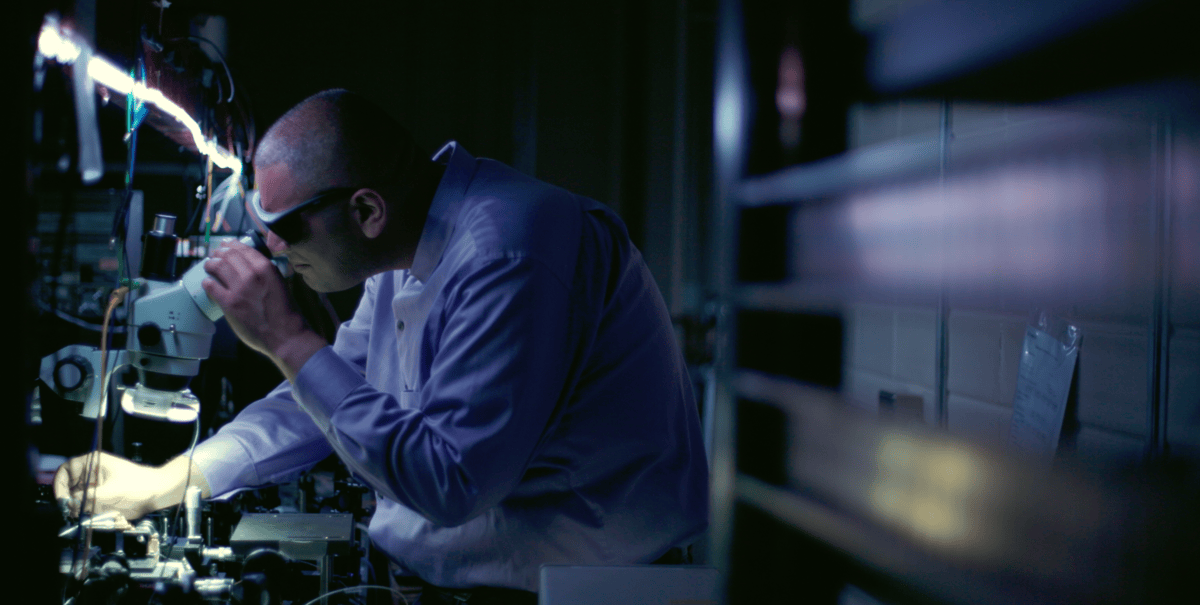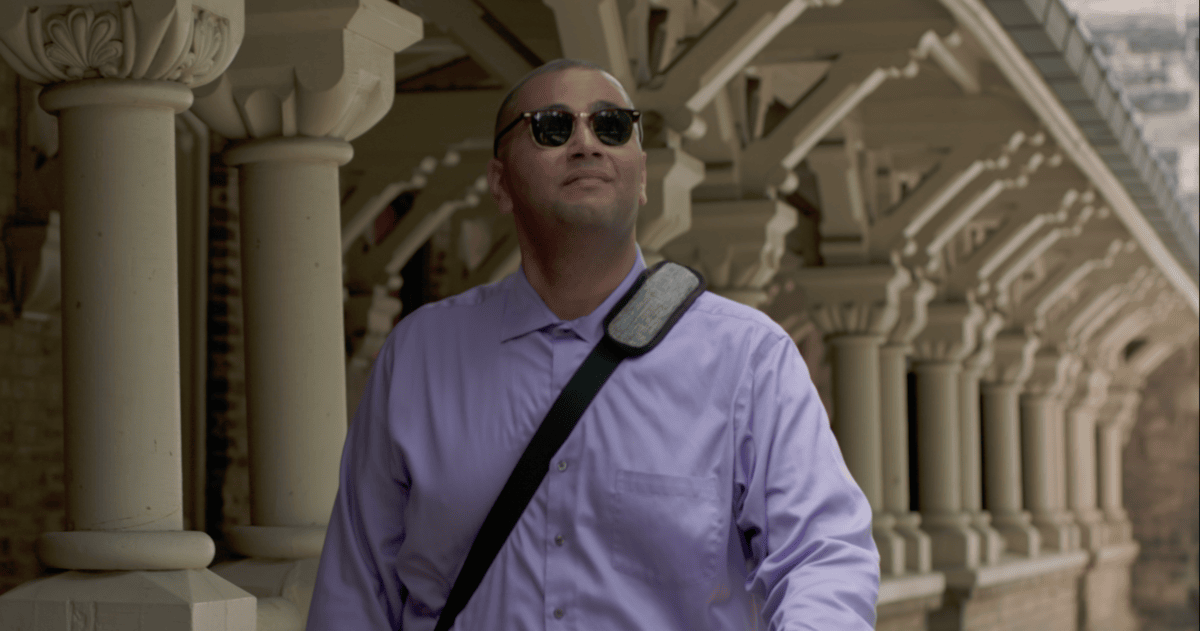Driving KSA’s semiconductor innovation future

Nasir Alfaraj, KAUST Ph.D. alumnus and Ibn Rushd Fellow, is currently conducting research at the University of Toronto, Canada, where he is advancing energy-efficient semiconductor technologies for international applications.
A passionate semiconductor researcher, KAUST Ph.D. alumnus Dr. Nasir Alfaraj is one of the esteemed recipients of the prestigious Ibn Rushd Fellowship, striving to revolutionize optoelectronics and power semiconductor devices. He works at the University of Toronto’s Edward S. Rogers Sr. Department of Electrical and Computer Engineering.
Undergraduate research at Western Michigan University introduced Alfaraj to practical applications. However, his interest in heterojunction devices truly solidified at KAUST. Under Professor Boon S. Ooi, Electrical and Computer Engineering, Alfaraj’s doctoral work on deep-ultraviolet optoelectronics explored wide-bandgap semiconductors, highlighting the transformative potential of optoelectronics and power electronics.
“This initial foray into heterojunctions at KAUST has profoundly shaped my research trajectory and continues to fuel my drive to explore their full potential for a wide range of applications, from energy-efficient power electronics to advanced optoelectronic systems.”
Motivated to explore electrical engineering further, KAUST attracted the young scholar with its commitment to interdisciplinary research, state-of-the-art facilities, and focus on sustainability and energy — qualities that strongly aligned with his academic and professional goals.
“The promise of a vibrant international research community and the University’s ambitious vision for contributing to scientific and technological advancement in Saudi Arabia and globally solidified my decision to pursue my graduate studies at KAUST,” he said, adding that KAUST shaped his research approach in several ways, emphasizing impactful, solutions-oriented science aligned with Saudi Vision 2030.
An interdisciplinary culture cultivated Alfaraj’s innovative mindset, blending semiconductor engineering, applied physics and materials science. Access to world-class facilities and mentorship prepared him for advanced roles within power electronics and optoelectronics research. “My time at KAUST was transformative, providing me with not only exceptional research training but also a global perspective and a lasting network of colleagues and mentors.”
KAUST afforded advanced nanofabrication experience, critical thinking opportunities, interdisciplinary teamwork and project management, equipping him to excel in semiconductor-device research and projects in Canada. “KAUST’s exceptional resources, dedicated mentorship and vibrant research environment provided a launchpad for my career.”

In the University of Toronto’s semiconductor lab, Alfaraj examines wide-bandgap materials under a high-resolution microscope.
Research and innovation
Alfaraj’s exploration into special semiconductor materials has led to major breakthroughs in power electronics and optoelectronics. One of his key discoveries has been a new method for growing this material on conductive ceramics, improving heat management in power devices. This advancement permits more efficient, high-performance electronics, helping to save energy and improve communication systems.
His innovations expand semiconductor technology by introducing materials such as gallium oxide and iridium oxide, enabling high-performance silicon-integrated devices while improving energy efficiency. These advancements impact industries such as renewable energy, electric vehicles, data centers, telecommunications and medical diagnostics by enhancing productivity and reducing energy consumption, while also enabling faster communication.
“My research is focused on addressing critical bottlenecks in semiconductor technology to enable more energy-efficient and high-performance devices,” he said. “The potential impact spans across numerous industries vital to global economic growth and sustainability, including energy, transportation, telecommunications and healthcare.”
KAUST and Ibn Rushd have enabled key achievements, he added, including pioneering a new growth mechanism for semiconductor materials that led to multiple patents and high-performance devices, securing competitive funding, publishing impactful research, and earning IEEE Senior Membership — all reflecting ongoing innovation.
The KAUST alumnus points to his co-founding of NovuSemi Hybridia Inc. in Canada as demonstrating his commitment to real-world applications. “I am immensely grateful for the foundational support and opportunities provided by KAUST, which have been crucial to my success and continue to shape my research career.”
KAUST’s talent generation
KAUST did not just shape Alfaraj’s career — it changed his life. The impact was not merely about research, he said, but about becoming a global citizen, building resilience, and gaining leadership skills. The University’s diverse, collaborative environment and entrepreneurial spirit prepared him to innovate and lead, while its Saudi Vision 2030 commitments inspired him to align his work with national progress.
The Ibn Rushd Fellowship has further strengthened his commitment to impactful semiconductor innovation and aligned his career goals with advancing Saudi Arabia’s technological landscape. “It has provided me with the resources, recognition and network to pursue ambitious research goals and solidify my commitment to contributing to semiconductor innovation and Saudi Arabia’s technological future.”
Cultivating the next generation of Saudi scientists and engineers is a vital role of KAUST, he added. By supporting national priorities and entrepreneurship, Alfaraj believes the University is empowering future leaders in science and technology to transform the Kingdom’s economy. “KAUST is, in my view, a cornerstone of Saudi Arabia’s efforts to build a thriving knowledge-based economy and a leader in global scientific innovation.”
Integral to this mission is Ibn Rushd, according to Alfaraj, as it enables Saudi researchers to advance in technology fields. By offering competitive support and world-class training, the fellowship attracts top talent, builds strategic expertise, and creates international networks — strengthening Saudi Arabia’s research profile while investing in human capital to build a pipeline of highly skilled in-Kingdom researchers.
Within the realm of semiconductor innovation specifically, he noted, Saudi researchers have vast opportunities driven by global market growth and national aspirations. KAUST is positioned to bridge the research-industry gap by supporting partnerships, developing industry-relevant curricula, enhancing fabrication facilities, fostering innovation, and promoting entrepreneurship in semiconductor technology.
“By actively pursuing these strategies, KAUST can become a catalyst for semiconductor innovation in Saudi Arabia, bridging the gap between research discoveries and industrial applications and helping to realize the Kingdom’s vision of becoming a technology leader in the region and globally.”

Strolling the University of Toronto campus, Alfaraj reflects on his journey — from foundational research education at KAUST to advancing energy-efficient semiconductor technologies with global impact.
Bright future ahead
Alfaraj expects exciting semiconductor advancements in areas such as new materials for optoelectronics and power electronics and faster data communication. His research intends to improve these materials and technologies, with KAUST helping him turn his work into practical technologies.
He reiterates that KAUST also plays a critical role in nurturing top talent, engaging young Saudis in cutting-edge research and global collaborations. Ibn Rushd strengthens this mission by investing in and mentoring future leaders in science, technology, engineering, and mathematics (STEM), providing advanced training while supporting the long-term growth and economic diversification of the nation.
“The Ibn Rushd Fellowship is a vital program within this broader ecosystem, strategically investing in top Saudi STEM talent, building expertise in critical fields, and securing a highly educated workforce that is essential for Saudi Arabia’s future success in a world increasingly shaped by science and technology.”
He added: “The future of Saudi Arabia’s technological landscape rests on the shoulders of its talented young scholars, and I am confident that they have the potential to achieve great things.”

